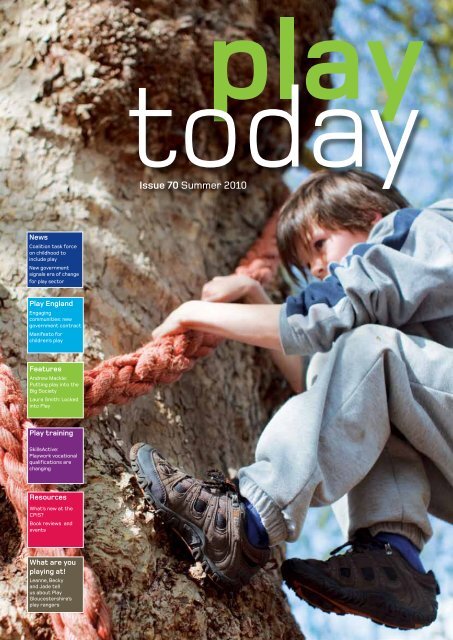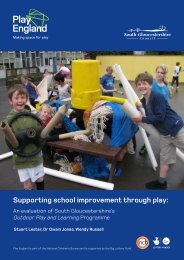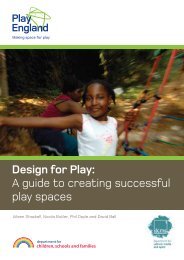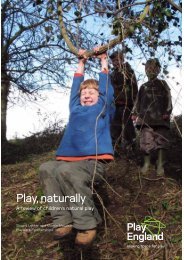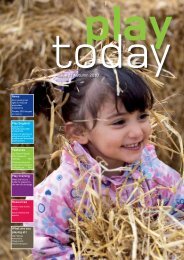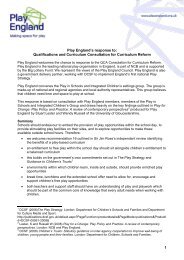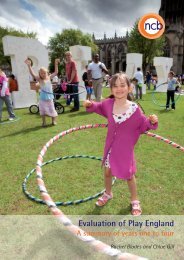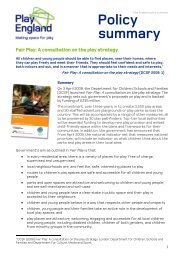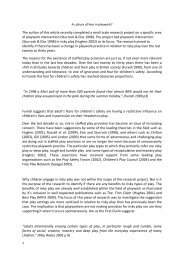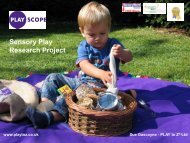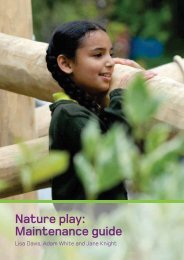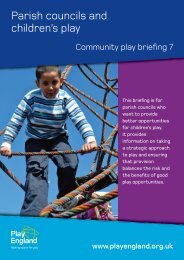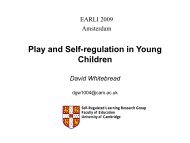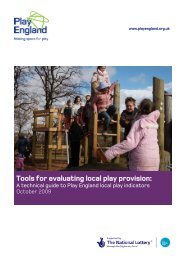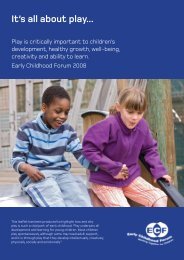PlayToday issue 70 - Play England
PlayToday issue 70 - Play England
PlayToday issue 70 - Play England
You also want an ePaper? Increase the reach of your titles
YUMPU automatically turns print PDFs into web optimized ePapers that Google loves.
Issue <strong>70</strong> Summer 2010<br />
News<br />
Coalition task force<br />
on childhood to<br />
include play<br />
New government<br />
signals era of change<br />
for play sector<br />
<strong>Play</strong> <strong>England</strong><br />
Engaging<br />
communities: new<br />
government contract<br />
Manifesto for<br />
children’s play<br />
Features<br />
Andrew Mackie:<br />
Putting play into the<br />
Big Society<br />
Laura Smith: Locked<br />
into <strong>Play</strong><br />
<strong>Play</strong> training<br />
SkillsActive:<br />
<strong>Play</strong>work vocational<br />
qualifications are<br />
changing<br />
Resources<br />
What’s new at the<br />
CPIS?<br />
Book reviews and<br />
events<br />
What are you<br />
playing at!<br />
Leanne, Becky<br />
and Jade tell<br />
us about <strong>Play</strong><br />
Gloucestershire’s<br />
play rangers
Wednesday 4 August<br />
<strong>Play</strong>day 2010<br />
The annual celebration of<br />
children’s right to play<br />
To find out how you can get involved, visit:
Contents<br />
News<br />
4 Coalition task force on<br />
childhood to include children’s<br />
play<br />
5 New government signals era<br />
of change for play sector<br />
6 London adventure playground<br />
destroyed in fire<br />
BIG’s Healthy Families<br />
programme awards £9.5 to<br />
play projects in Wales<br />
7 IPA world conference 2011<br />
website goes live<br />
<strong>Play</strong> <strong>England</strong><br />
10 Engaging communities: new<br />
government contract for <strong>Play</strong><br />
<strong>England</strong><br />
11 Children get just one hour of<br />
play a day<br />
12 <strong>Play</strong> <strong>England</strong> in the regions<br />
Features<br />
14 Andrew Mackie: Putting play<br />
into the Big Society<br />
16 Laura Smith: Locked into <strong>Play</strong><br />
<strong>Play</strong> training<br />
18 <strong>Play</strong>work vocational<br />
qualifications are changing<br />
Ensuring quality<br />
20 Quality in <strong>Play</strong> assessor<br />
training<br />
Child-friendly communities<br />
21 Keeping a community safe and<br />
playful<br />
Resources and events<br />
22 Book review: Leadership<br />
for Quality in Early Years and<br />
<strong>Play</strong>work<br />
What’s new at the Children’s<br />
<strong>Play</strong> Information Service?<br />
What are you playing at?<br />
24 <strong>Play</strong> Gloucestershire’s play<br />
rangers<br />
Editorial<br />
As we approach the end of the Big Lottery Fund Children’s <strong>Play</strong><br />
initiative that sparked such unprecedented growth and change in our<br />
sector, the climate for sustaining and building upon the huge gains of<br />
the last four years, on the face of it, could hardly be less favourable.<br />
Whilst Britain tentatively recovers from the worst recession since<br />
the war, the public sector is paying a heavy price as the coalition<br />
government aims to bring down the budget deficit.<br />
Investment in children’s play has already suffered, with local authority<br />
playbuilders no longer having their capital funding ring-fenced and losing<br />
their revenue funding altogether (pathfinders will lose 50 per cent of<br />
theirs). The longer-term outlook is no less bleak. With the Treasury<br />
requiring cuts of anything between 25 and 40 per cent from almost<br />
every government department, the settlements for local authorities<br />
will be very tough and the prospect for staffed play services and<br />
maintenance budgets is grim. With more than half its income coming<br />
from statutory bodies, the voluntary sector is facing no less tough a<br />
time. <strong>Play</strong> <strong>England</strong>’s own government contracts are being drastically<br />
reduced, with the resulting departure of some excellent colleagues,<br />
prefacing, no doubt, a much wider cull across the sector.<br />
Looking for silver linings within such a gloomy outlook may seem like<br />
clutching at straws, but there is room for some cautious optimism<br />
beyond the immediate pain of cuts.<br />
Most immediately, play has been named by the government as one<br />
of only five priorities thus far identified for a childhood and families<br />
task force announced in June by Deputy Prime Minister Nick Clegg.<br />
This ministerial grouping, chaired by the Prime Minister himself, will<br />
inform the spending review this autumn; one of the most important<br />
for many years and likely to shape the policy context across the whole<br />
public sector for the first term of this government. The Deputy PM’s<br />
statement posed more questions than it offered clues about a new play<br />
policy, but the fact that he and the Prime Minister are even asking these<br />
questions is highly significant and represents a real opportunity to put<br />
playable neighbourhoods at the heart of the new vision for communities.<br />
More generally, although the play sector has taken an early hit from the<br />
deficit reduction programme, we can at least look back on four full years<br />
of growth and know that many of the recent changes will last and be<br />
there to build upon when the economy picks up again.<br />
The play sector is resilient – over the years it has had to be – and<br />
although these are difficult times, the events of the last few weeks<br />
show that, far from being an obvious casualty altogether of the ‘smaller<br />
state’, children’s play could very well be at the heart of a new vision<br />
for the ‘big society’. Now, more than ever, we must seize this moment.<br />
Adrian Voce Director, <strong>Play</strong> <strong>England</strong><br />
play<br />
today<br />
Editor Ken Ryan<br />
Coordinator Susan Pape<br />
Editorial group<br />
Adrian Voce, Becky McLauchlan, Steven Chown,<br />
Amy Little, Annie Hunter-Wade, Richard Newson,<br />
Anna Kassman-McKerrell (CPIS),<br />
Uzma Ahmad (SkillsActive), Rachel Scott (KIDS),<br />
Tim Ferguson (Manchester Young Lives).<br />
Correspondence<br />
The Editor, <strong><strong>Play</strong>Today</strong>, <strong>Play</strong> <strong>England</strong>,<br />
8 Wakley Street, London EC1V 7QE<br />
Tel: 020 7843 6300<br />
Email: playtoday@ncb.org.uk<br />
Advertising and inserts<br />
Susan Pape Tel: 020 7843 6447<br />
Printer Rap Spiderweb<br />
Front cover image: Tree climbing at St Paul’s<br />
Adventure <strong>Play</strong>grond, Bristol.<br />
The views expressed in <strong><strong>Play</strong>Today</strong> are not<br />
necessarily those of the publishers.<br />
<strong><strong>Play</strong>Today</strong> is produced by <strong>Play</strong> <strong>England</strong>.<br />
Published for <strong>Play</strong> <strong>England</strong> by NCB, 2010.<br />
<strong>Play</strong> <strong>England</strong> is part of NCB and is supported<br />
by the Big Lottery Fund.<br />
3
News<br />
Coalition task force on childhood to include<br />
children’s play as one of five priorities<br />
The coalition government’s policy agenda looks set to include play,<br />
after Deputy Prime Minister, Nick Clegg announced in June that a<br />
new ministerial Childhood and Families Task Force, chaired by the<br />
Prime Minister, will look for ‘innovative … new solutions’ to providing<br />
spaces where children can play.<br />
Announcing the move in a south<br />
London Sure Start centre at a<br />
Barnado’s hosted event, Clegg<br />
said that the task force will<br />
help government to identify and<br />
prioritise the policies which will<br />
make a big difference to children<br />
and families.<br />
Crucially, children’s play will be<br />
one of the five key priorities for<br />
the task force to examine. Outlining<br />
the rationale for this, the Deputy<br />
Prime Minister said: ‘Every parent<br />
understands the importance of<br />
a secure environment for their<br />
children. Spaces where they can<br />
play, where they can feel completely<br />
free, where they can safely push<br />
at the boundaries, learning and<br />
experimenting.’<br />
Clegg also quoted <strong>Play</strong>day statistics<br />
on the decline of street play,<br />
saying: ‘If you ask adults if they used<br />
to play near their homes as children,<br />
71 per cent will tell you they did,<br />
every single day. That compares to<br />
just 21 per cent of children now. It’s<br />
not right, and it has to change.’<br />
The task force, to be chaired by<br />
Five task force priority areas<br />
David Cameron, will include Liberal<br />
Democrat children’s minister<br />
Sarah Teather; work and pensions<br />
secretary Iain Duncan Smith; public<br />
health minister Anne Milton, and the<br />
universities minister David Willetts<br />
who produced the Conservatives’<br />
2008 childhood review More Ball<br />
Games. The task force aims to<br />
complete its review by the autumn<br />
ahead of the next public spending<br />
review and is expected to report its<br />
conclusions at the end of the year.<br />
Welcoming the announcement,<br />
<strong>Play</strong> <strong>England</strong> director Adrian Voce,<br />
said: ‘It’s hugely encouraging that,<br />
although the economic conditions<br />
have changed massively since the<br />
launch of the last government’s<br />
<strong>Play</strong> Strategy, children’s play is<br />
still evidently at the heart of our<br />
country’s vision for childhood,<br />
families and communities. This<br />
vision is clearly shared across the<br />
political spectrum, no matter the<br />
differences in broader policy terms.<br />
‘We hope that the task force will<br />
conclude that the importance of<br />
good, free play areas, playable public<br />
Image: Nick Clegg at the Crawford<br />
Children’s Centre in Camberwell<br />
space and the role of playworkers<br />
– paid and voluntary – is even<br />
more pronounced for children and<br />
communities living through hard<br />
times.<br />
‘The Big Society is not a new<br />
concept to the play movement,<br />
which began with local people<br />
organising themselves to respond<br />
to children’s need for somewhere<br />
to play together. The need for this<br />
movement is now greater than ever.<br />
We are looking forward to working<br />
with the government to identify ways<br />
that it can help today’s communities<br />
to make more and better space for<br />
their children to play.’<br />
4<br />
Parental leave<br />
Promotion of flexible<br />
leave to strike a balance<br />
between work and home.<br />
Disabled children<br />
More support for families<br />
of disabled children<br />
through respite care and<br />
community based support.<br />
Strengthening families<br />
Relationship support to help<br />
prevent family breakdowns<br />
and more emphasis on<br />
other support networks:<br />
grandparents, neighbours,<br />
friends and charities.<br />
<strong>Play</strong>ful communities<br />
Secure environments for<br />
children that bring people<br />
together with a focus on<br />
how local communities can<br />
be empowered to deliver<br />
changes in their own<br />
neighbourhoods.<br />
Commercialisation of<br />
childhood<br />
Tackle irresponsible<br />
marketing aimed at<br />
children which can<br />
introduce stress more<br />
associated with adulthood.<br />
Sharing a platform with Sarah Teather at<br />
NCB’s Summer Reception, NCB chief executive<br />
Sir Paul Ennals, welcomed the task force,<br />
saying: ‘I am very pleased that disabled children<br />
and play are two of the first five themes Nick<br />
Clegg spoke of; two themes where NCB is<br />
proud of the leadership role we have played in<br />
partnership within the sector over many years.’
New government signals era of change for play sector<br />
As the new coalition government<br />
sets out its policy priorities, the<br />
impact of a new era of austerity<br />
has been immediately felt by the<br />
play sector. Here is a summary of<br />
the significant changes to date:<br />
Department for Education<br />
The new Department for Education<br />
(DfE) quickly replaced the<br />
Department for Children, Schools<br />
and Families in May. Senior Conservative,<br />
Michael Gove leads the<br />
department as education secretary,<br />
supported by Sarah Teather (Liberal<br />
Democrat) as children’s minister,<br />
and Tim Loughton (Conservative)<br />
as under-secretary of state for<br />
children and families.<br />
No minister has been officially<br />
announced as having play in their<br />
portfolio but there are signs that<br />
both Tim Loughton and Sarah<br />
Teather are interested in the play<br />
agenda. There is still a play team<br />
within the Wellbeing Department<br />
at DfE. The website still contains<br />
the <strong>Play</strong> Strategy and associated<br />
guidance, although with the overall<br />
rider that ‘content may not reflect<br />
current government policy’.<br />
£6.2bn savings this financial year<br />
On 24 May, Chancellor George<br />
Osborne announced efficiency<br />
savings totalling £6.2bn across<br />
government. DfE is expected to<br />
make savings of £6<strong>70</strong>m.<br />
Local government was also asked<br />
to contribute £1.166bn to these<br />
savings. Government has removed<br />
the ring fence around £1.7bn of<br />
capital grants including pathfinder/<br />
play builder grants totalling £75m.<br />
At this stage it is unclear how many<br />
local authorities will divert their play<br />
capital money to spend elsewhere.<br />
Revenue funding to play pathfinders<br />
has been cut by 50 per<br />
cent, whilst playbuilder revenue has<br />
been withdrawn completely. DfE<br />
expects pathfinders to make the<br />
staffing of adventure playgrounds<br />
built through their play capital programme<br />
a priority for remaining<br />
funding.<br />
Other <strong>Play</strong> Strategy revenue<br />
streams have been curtailed<br />
with a reduction of £5m. Savings<br />
coming from a variety of strands<br />
include <strong>Play</strong> <strong>England</strong>’s support and<br />
challenge work with play pathfinder<br />
and playbuilder local authorities.<br />
<strong>Play</strong> <strong>England</strong> will no longer monitor<br />
the play pathfinder and playbuilder<br />
progress as its support and<br />
challenge role comes to an end.<br />
The emergency budget<br />
In the June emergency budget, the<br />
chancellor announced cuts across<br />
all government departments of 25<br />
per cent over four years, except<br />
health and international development<br />
which are ring fenced.<br />
The chancellor did recognise<br />
the ‘particular pressures on<br />
the education system’. He also<br />
announced that the comprehensive<br />
spending review, which sets spending<br />
plans for the whole of this<br />
parliament, will be published on 20<br />
October 2010.<br />
Vetting and barring scheme<br />
Registrations to the vetting<br />
and barring scheme have been<br />
halted to allow the government<br />
to ‘remodel the scheme back to<br />
more proportionate, common<br />
sense levels’. Although the scheme<br />
is halted whilst under review,<br />
new safeguarding regulations<br />
introduced in October 2009<br />
continue to apply.<br />
The Independent Safeguarding<br />
Authority (ISA) will continue<br />
to maintain updated lists of<br />
those barred from working with<br />
children and vulnerable adults.<br />
Existing Criminal Records Bureau<br />
requirements will remain in place.<br />
Employers are still legally obliged<br />
to inform the ISA if an individual is<br />
moved because they have harmed<br />
or there is a risk of harming a<br />
member of a vulnerable group.<br />
Monitoring local authority<br />
performance<br />
The government is committed<br />
to cutting local government<br />
inspection and has scrapped the<br />
Comprehensive Area Assessment<br />
(CAA) which assesses how well local<br />
public services are performing.<br />
It was administered by the Audit<br />
Commission which has written to<br />
local authorities explaining how it<br />
will conclude its CAA work.<br />
The future of National Indicator<br />
199 ‘children’s levels of satisfaction<br />
with parks and play areas’ is<br />
unclear as the collection of data<br />
for the Tellus survey, which informs<br />
progress under NI 199, has been<br />
halted as part of the government’s<br />
commitment to reduce the burdens<br />
of data collection on schools and<br />
local authorities.<br />
Early years provision and the<br />
primary curriculum<br />
Sarah Teather announced a review<br />
of the Early Years Foundation Stage<br />
(EYFS) framework, which ministers<br />
consider as being ‘too rigid and<br />
leads to a tick-box approach’. The<br />
review is to be carried out by Dame<br />
Clare Tickell, chief executive of the<br />
charity Action for Children who<br />
has requested a meeting with <strong>Play</strong><br />
<strong>England</strong> and SkillsActive to discuss<br />
EYFS <strong>issue</strong>s affecting the sector.<br />
The EYFS has had a lukewarm<br />
reception by many play providers<br />
who consider the framework to be<br />
at odds with the <strong>Play</strong>work Principles.<br />
Sure Start centres will be scaled<br />
back taking it ‘back to its original<br />
purpose of early intervention, to<br />
increase its focus on the neediest<br />
families.’ The planned reform of<br />
the primary curriculum in <strong>England</strong>,<br />
based on last year’s review by Sir<br />
Jim Rose, has been scrapped.<br />
Consultation on lottery funding<br />
The Department for Culture<br />
Media and Sport is carrying out a<br />
consultation into the proportion of<br />
money going to each of the lottery<br />
distributors. Their proposal is to<br />
reduce the proportion of money<br />
going to the Big Lottery Fund from<br />
46 per cent to 40 per cent and<br />
increase the proportion going to<br />
arts, heritage and sports from 18<br />
per cent each to 20 per cent each.<br />
This would be spread over two years.<br />
Workforce development<br />
The Children’s Workforce<br />
Development Council’s (CWDC)<br />
budget will be reduced by £15m<br />
over the next financial year. The<br />
figure amounts to around 10%<br />
of the CWDC’s overall budget of<br />
£149m for 2010-11. It’s not known<br />
if these cuts will affect the CWDCmanaged<br />
training initiative enabling<br />
playworkers to achieve Level 3 NVQ<br />
in playwork.<br />
5NEWS
6<br />
Think tank<br />
says playwork<br />
qualification should<br />
be ‘suspended<br />
immediately’<br />
The Conservative think tank, the<br />
Centre for Policy Studies, has called<br />
for the immediate suspension of<br />
the playwork qualification as it is<br />
‘of unproven value’.<br />
In a report published in June<br />
that recommends cuts to The<br />
Children’s Plan, the authors Tom<br />
London adventure<br />
playground<br />
destroyed in fire<br />
A fierce fire destroyed parts<br />
of the Timbuktu Adventure<br />
<strong>Play</strong>ground, a voluntary sector<br />
playground that recently<br />
received funding from <strong>Play</strong><br />
<strong>England</strong>’s third sector adventure<br />
playground funding programme.<br />
The popular playground<br />
received £19,000 from the<br />
funding programme for recent<br />
refurbishments which were<br />
destroyed by the fire on 24 May.<br />
Damage to the playground<br />
is estimated in the region of<br />
Image: Fire damage at Timbuktu Adventure <strong>Play</strong>ground<br />
Burkard and Tom Clelford, identify<br />
spending commitments from<br />
the <strong>Play</strong> Strategy as ‘expensive<br />
luxuries which should be the<br />
natural object of interest for the<br />
National Lottery’.<br />
They state that central funding<br />
for the pathfinder and playbuilder<br />
schemes should be scrapped<br />
together with the funding for<br />
4,000 playworkers to complete a<br />
level three vocational qualification.<br />
❰ The report: Cutting the<br />
Children’s Plan is available online<br />
at: http://www.cps.org.uk ❱<br />
£<strong>70</strong>,000, and a recently built<br />
climbing wall, climbing frames,<br />
swings, bikes, benches and most<br />
regrettable, a massive wooden<br />
ship, were all reduced to ashes.<br />
Community supporters and<br />
neighbours are currently trying to<br />
collect enough funds to cover the<br />
costs of the damage and restore<br />
the playground. Commenting on<br />
the reaction of the community,<br />
Darren McLaughlin who works at<br />
Timbuktu said: ‘The community is<br />
devastated. People keep offering<br />
help and one school is planning a<br />
fundraising event.’<br />
Islington Police and London Fire<br />
Brigade are still investigating the<br />
cause of the fire.<br />
BIG’s Healthy<br />
Families programme<br />
awards £9.5m to<br />
play projects in<br />
Wales<br />
The Big Lottery Fund (BIG)<br />
recently announced a £9.5m<br />
cash boost for 10 play<br />
projects to create new play<br />
initiatives and facilities in local<br />
communities across Wales.<br />
These grants, from the Child’s<br />
<strong>Play</strong> strand of BIG’s £20m Healthy<br />
Families programme, aim to<br />
achieve one of the three following<br />
outcomes: get more children<br />
accessing play opportunities;<br />
create a local infrastructure to<br />
provide and plan for children’s<br />
play activities; or develop a<br />
joined-up approach to nutrition,<br />
physical activity and play.<br />
Four of this round’s grant<br />
winners include Cardiff City<br />
Council’s Cardiff and Vale<br />
<strong>Play</strong> Project who received<br />
£998,177; Rhondda Cynon Taff<br />
<strong>Play</strong> Association’s Branching<br />
out Community <strong>Play</strong> Project<br />
was awarded £979,511, and<br />
Carmarthenshire Association<br />
of Voluntary Services was<br />
allocated close to £1m, which<br />
will be used to provide mobile<br />
play facilities for 1,000 children<br />
aged 12 and over.<br />
The Torfaen Voluntary<br />
Alliance received funding to<br />
develop a toolkit to support<br />
the sustainability of community<br />
based play projects across<br />
Torfaen, Newport and<br />
Monmouthshire. Commenting<br />
on their award, John Taylor,<br />
operations manager of the<br />
Torfaen Voluntary Alliance, said:<br />
‘We are pleased and proud to<br />
be the recipient of a grant<br />
and look forward to improving<br />
and enhancing play provision…<br />
This money will make a massive<br />
difference to our project.’<br />
❰ Find out more at: www.<br />
biglotteryfund.org.uk/wales ❱
Survey finds parents fear child<br />
abduction over health risks of childhood<br />
obesity<br />
A survey by the national charities<br />
Parentline Plus and Living<br />
Streets, as part of the national<br />
Walk to School Week campaign,<br />
found that a majority of parents<br />
fear their child being abducted or<br />
killed in a road accident over the<br />
more likely threat to their health<br />
from childhood inactivity leading<br />
to obesity.<br />
Results revealed that 30<br />
per cent of parents feared the<br />
abduction or murder of their<br />
child while only five per cent<br />
expressed concern over their<br />
child’s poor health later in life due<br />
to current levels of childhood<br />
inactivity. These figures greatly<br />
contrast the statistics that show<br />
that the actual threat of a child<br />
being abducted or murdered by<br />
a stranger is one in one million,<br />
whereas a child’s risk of severe<br />
health <strong>issue</strong>s and mortality as a<br />
result of lack of physical exercise<br />
is one in three.<br />
The results also show that<br />
half of the parents surveyed<br />
underestimated how much<br />
physical exercise is needed for<br />
a child to maintain a healthy<br />
lifestyle. The government<br />
recommends that children<br />
participate in seven hours<br />
of physical activity per week;<br />
however the results reveal that<br />
only 68 per cent of boys and 76<br />
per cent of girls actually meet<br />
this recommendation.<br />
The survey supports Living<br />
Streets’ national Walk to School<br />
Week campaign which encourages<br />
parents and children to engage in<br />
physical activity by leaving the car<br />
at home and walking to school.<br />
IPA world conference 2011<br />
website goes live<br />
The website for the International <strong>Play</strong><br />
Association’s (IPA) triennial world conference,<br />
taking place next year on 4-7 July 2011 in<br />
Cardiff, is now online.<br />
Hosted by <strong>Play</strong><br />
Wales on behalf of<br />
the IPA, the 50th<br />
anniversary world<br />
conference will focus<br />
on the theme of play<br />
in the future, and<br />
explore the ways<br />
to create a future where playing is valued<br />
and where every country and neighbourhood<br />
upholds all children’s right to time, freedom,<br />
and a safe enough environment for play.<br />
Wales Cymru<br />
2011<br />
The conference will cover the themes related<br />
to play: individual and social; environment and<br />
space; and society and culture.<br />
Taking place over four days, the conference<br />
offers delegates the opportunity to share<br />
evidence, experience and examples of good<br />
practice with colleagues from around the<br />
world. Registration opens 1 September 2010,<br />
and the deadline for abstracts and proposals<br />
is 10 November 2010.<br />
❰ Visit the website at: www.ipa2011.org ❱<br />
Pensioners’ playground opens in<br />
London’s Hyde Park<br />
A £50,000 playground for ‘pensioners’ is open in<br />
Hyde Park through a joint project between the<br />
Westminster City Council and The Royals Parks.<br />
The first-ever, public pensioners’ playground in<br />
London opened to give older park users a chance to<br />
work out in the middle of Hyde Park. The 125 squaremetre<br />
playground includes fitness equipment such<br />
as: a cross-trainer, sit-up bench, body-flexer, free<br />
runner, flex wheel and exercise bike.<br />
Drawing from similar ideas in China and Europe,<br />
The Royal Parks and the council initiated this<br />
project as a way to encourage people of all ages<br />
to get outside, socialise, exercise and most<br />
importantly, have fun.<br />
www.nottssport.com<br />
Innovation House, Magna Park, Lutterworth, LE17 4XH, UK | t. +44 [0] 1455 883 730 | f. +44 [0] 1455 883 755 | e. info@nottssport.com<br />
NOTTS SPORT® & CHILDSPLAY® are registered trademarks.<br />
7
Prince William<br />
launches<br />
campaign to save<br />
playing fields<br />
As part of the Queen’s Diamond<br />
Jubilee celebrations, Prince<br />
William recently launched a<br />
campaign to legally protect over<br />
2,000 public playing fields by 2012.<br />
Prince William is patron of the<br />
Queen Elizabeth II Fields Challenge,<br />
a campaign by Fields in Trust<br />
(formally the National <strong>Play</strong>ing<br />
Fields Association), to protect<br />
public playing fields and outdoor<br />
play space as a childhood right.<br />
The campaign aims to permenantly<br />
protect over 2,000 sites.<br />
In a video announcement<br />
launching the campaign, the<br />
Prince stressed: ‘Being able to<br />
play outdoors is a basic right of<br />
childhood. The Queen Elizabeth<br />
II Fields Challenge will guarantee<br />
that millions more children are<br />
able to enjoy that right both now<br />
and in the future.’<br />
This campaign is part of the<br />
Diamond Jubilee celebrations to<br />
mark the Queen’s 60th year on<br />
the throne. Together with Fields<br />
in Trust, this campaign hopes<br />
to acquire legal protection for<br />
existing fields and to create<br />
new playing fields by persuading<br />
landowners to allow their land to<br />
come under a deed of dedication.<br />
Alison Moore Gwyn, chief<br />
executive of Fields in Trust<br />
Children enjoy a kick-about at the launch<br />
reiterated the charity’s aims<br />
through the programme: ‘Fields<br />
in Trust’s core vision is to ensure<br />
that everyone – whether they<br />
are young or old, able or disabled<br />
and no matter where they live –<br />
has access to outdoor space for<br />
sport, play and recreation.’<br />
❰ Visit the campaign website at:<br />
www.qe2fields.com ❱<br />
8<br />
KIDS reaches milestone of<br />
1,000th short break<br />
KIDS’ Direct Short Breaks service reached<br />
the milestone of providing 1,000 short breaks<br />
to disabled children, young people and their<br />
families after 10 months of the Parliamentary<br />
launch of the internet-based service.<br />
KIDS, a national charity providing a range of<br />
services for disabled children, young people<br />
and their families across seven English regions,<br />
initiated the Direct Short Break service in<br />
February 2009 to provide parents of disabled<br />
children and young people with short breaks,<br />
provided by fully trained workers. The service,<br />
entirely booked online, allows disabled children<br />
and young people the opportunity to enjoy and<br />
experience activities of interest with the support<br />
of a Short Break Worker while their parents can<br />
confidently take a break.<br />
The 1,000th short break took place in Blackburn<br />
in the end of April when a worker accompanied a<br />
17-year-old girl as she went to get her hair cut.<br />
❰ Find out more at www.kids.org.uk ❱<br />
IKEA launches ‘<strong>Play</strong>report’<br />
Recognising the importance of play, IKEA<br />
recently commissioned a play report based<br />
on research gathered from 8,000 parents and<br />
3,000 children aged 7-12 years worldwide to<br />
better understand parents’ and children’s play<br />
experiences and the role of play in childhood<br />
development.<br />
Researchers used social media as a way to<br />
gather data and found that many parents are<br />
worried about play when it is not accompanied<br />
by an educational agenda. Another interesting<br />
finding is that many parents feel that they have<br />
lost the ability to play. The report alternatively<br />
suggests that play is a powerful learning engine<br />
for children and that children incorporate play<br />
into every aspect of a family home and into<br />
everyday activities.<br />
Fredrik Bengtsson who specialises in the<br />
children’s line at IKEA stressed: ‘<strong>Play</strong> isn’t just fun,<br />
it’s important – helping children develop skills for<br />
life. So we take the fun of play seriously.’<br />
❰ For more information visit the <strong>Play</strong>report<br />
Facebook pages at: www.facebook.com/playreport ❱
<strong>Play</strong>day 2010:<br />
Our place<br />
Better places to live and play<br />
On 4 August, thousands of children, young people<br />
and families across the UK will get out and play<br />
in their local communities as part of this year’s<br />
<strong>Play</strong>day 2010 campaign.<br />
Hundreds of events will take place across the UK<br />
to mark <strong>Play</strong>day 2010, giving thousands of children,<br />
young people and families the opportunity to get<br />
out and play for the day. As well as a celebration<br />
of children’s right to play, these events are the<br />
cornerstone of a wider campaign that focuses on<br />
current <strong>issue</strong>s affecting children’s play.<br />
The <strong>Play</strong>day 2010 Our place campaign aims to<br />
address the barriers children face playing out in<br />
their local communities. The campaign seeks to<br />
challenge negative perceptions of children playing<br />
outside, and is pushing for a cultural change so that<br />
more children can get out and play where they live.<br />
Don’t forget to register!<br />
Getting involved in <strong>Play</strong>day<br />
where you live?<br />
Free event packs are up for<br />
grabs for every registered<br />
<strong>Play</strong>day event, while stocks<br />
last!<br />
By addressing<br />
opportunities<br />
for children and<br />
young people<br />
to play freely,<br />
neighbourhoods<br />
can be<br />
transformed<br />
into trusted<br />
places where everyone feels welcome. For this to<br />
happen, policy makers both nationally and locally<br />
need to address the barriers children and families<br />
now face, such as increased traffic, wider safety<br />
concerns, intolerance and public spaces designed<br />
with only adult needs in mind. <strong>Play</strong> <strong>England</strong> and<br />
partners are working to influence policy makers at<br />
a national level, and the hundreds of individuals and<br />
groups planning local <strong>Play</strong>day events are making<br />
a crucial difference to raise the profile of play in<br />
their communities.<br />
You can help put play back where it belongs by<br />
planning your own <strong>Play</strong>day celebration - there’s<br />
still plenty of time to get involved. There’s guidance<br />
on the <strong>Play</strong>day website to help you celebrate with<br />
friends and neighbours and connect with your<br />
community on <strong>Play</strong>day and beyond. If you’re unable<br />
to plan your own event, there are lots of other<br />
<strong>Play</strong>day 2009, Bristol<br />
ways to celebrate. You could: attend a <strong>Play</strong>day<br />
event or offer to volunteer at one; promote<br />
the national campaign using the free resources<br />
available via the <strong>Play</strong>day website; or start a local<br />
campaign to address the barriers to children’s<br />
play where you live. Where and how you decide<br />
to celebrate <strong>Play</strong>day is up to you – what’s really<br />
important is that children and young people get to<br />
have fun, and that you help raise awareness about<br />
children’s right and need to play outdoors.<br />
For more information about <strong>Play</strong>day 2010, or to<br />
search for <strong>Play</strong>day events near you, visit:<br />
www.playday.org.uk<br />
Win a digital camera!<br />
Enter the <strong>Play</strong>day 2010 drawing consultation<br />
- open to anyone under 18. Simply create a<br />
picture showing ‘What’s it like to play where you<br />
live?’, and send it to <strong>Play</strong> <strong>England</strong>.<br />
For more information and to download a<br />
template, visit www.playday.org.uk<br />
9
Promoting excellent free play opportunities for all children and young people<br />
Engaging communities: new<br />
government contract for<br />
<strong>Play</strong> <strong>England</strong><br />
As <strong><strong>Play</strong>Today</strong> goes to press, <strong>Play</strong> <strong>England</strong> is<br />
finalising the details of a government contract<br />
to deliver Engaging Communities in <strong>Play</strong>, a new<br />
programme aimed at supporting communities to<br />
manage and sustain local play provision.<br />
The programme will focus on communities near<br />
to new play provision, in particular either the new<br />
adventure playgrounds built by play pathfinder local<br />
authorities or those around adventure playgrounds<br />
that secured small grants from <strong>Play</strong> <strong>England</strong> last year.<br />
In addition, there will be a stronger online presence<br />
and networks to share good practice across <strong>England</strong><br />
in developing and sustaining local play provision, and<br />
help for those needing additional advice.<br />
The programme has been designed to use <strong>Play</strong><br />
<strong>England</strong>’s strengths in advising and supporting<br />
communities, building networks, offering advice<br />
and guidance, running workshops and events,<br />
encouraging the participation of children and young<br />
people, and offering <strong>Play</strong> Shaper training.<br />
Work has already started on this new<br />
programme with six <strong>Play</strong> Shaper training sessions<br />
taking place in July, including two piloting the new<br />
Placemaking and <strong>Play</strong> content, which targets<br />
planners and transport staff. Three Community<br />
<strong>Play</strong> Enablers are also working with voluntary<br />
sector organisations in Wakefield, Leicester<br />
and Haringey. <strong>Play</strong> <strong>England</strong> will continue to work<br />
with its current partners KIDS, SkillsActive and<br />
<strong>Play</strong>work Partnerships, and will seek to strenghten<br />
relationships with contacts already established<br />
through its work to date.<br />
<strong>Play</strong> <strong>England</strong> is particularly happy that the<br />
Department for Education has approved the ongoing<br />
use of the <strong>Play</strong> Shaper brand, and <strong>Play</strong> <strong>England</strong> will<br />
be offering these successful training programmes<br />
to local authorities from September onwards.<br />
❰ For more details please go to:<br />
www.playengland.org.uk, www.playshaper.org.uk<br />
and www.playfulcommunities.org.uk ❱<br />
10<br />
<strong>Play</strong> <strong>England</strong> proposes<br />
reorganisation<br />
In June, <strong>Play</strong> <strong>England</strong> announced a proposed<br />
reorganisation in the light of the imminent<br />
reduction in the value of its contracts with<br />
the Department for Education for 2010-11, the<br />
removal of ‘ring-fenced’ funding for local play<br />
provision and the changing policy context for the<br />
play agenda under the coalition government.<br />
<strong>Play</strong> <strong>England</strong> has launched a staff consultation<br />
on a proposed new, reduced structure. Regional<br />
offices would close under the proposals, but a<br />
range of new jobs will have a regional and local<br />
focus as <strong>Play</strong> <strong>England</strong> seeks to build upon the<br />
experience and networks created over the last<br />
four years.<br />
<strong>Play</strong> <strong>England</strong> will continue to run a variety of<br />
events and training programmes through the year<br />
and is, in particular, looking forward to <strong>Play</strong>day,<br />
which takes place on Wednesday, 4 August. The<br />
staff consultation concludes in early August.<br />
Neighbourhood police briefing<br />
<strong>Play</strong> <strong>England</strong> has published a<br />
new briefing looking at the<br />
role of the police in ensuring<br />
that children and young people<br />
playing in their local area feel<br />
safe and that their families are<br />
confident they will be safe.<br />
Supporting children to<br />
play safely outlines how local<br />
community police and play providers<br />
can work together to improve the safety of children<br />
and young people at play; support local and national<br />
policies and targets to ensure the well-being of<br />
children; improve community cohesion and reduce<br />
youth crime and anti-social behaviour; and improve<br />
the confidence of communities in the local policing.<br />
The briefing outlines why play and informal<br />
recreation is important and includes practical<br />
advice, guidance and case studies.<br />
❰ To download a free copy, please visit<br />
www.playengland.org.uk/resources ❱
Manifesto aims to<br />
keep play on the<br />
political agenda<br />
Three months on from its launch,<br />
the <strong>Play</strong> <strong>England</strong> Manifesto for<br />
children’s play continues to gain<br />
support.<br />
The manifesto sets out three<br />
simple principles that <strong>Play</strong> <strong>England</strong><br />
wants all politicians to adopt as<br />
part of their policies for children<br />
and young people. The overall aim<br />
is to ensure that today’s children<br />
have the same freedom and<br />
space to play enjoyed by previous<br />
generations. The principles are:<br />
1. To make all residential<br />
neighbourhoods child-friendly<br />
places where children can play<br />
outside.<br />
2. To give all children the time and<br />
opportunity to play throughout<br />
childhood.<br />
3. To give all children somewhere<br />
to play – in freedom and safety<br />
– after school and in the<br />
holidays.<br />
Children get just one<br />
hour of play a day<br />
Figures released in June by<br />
The British Toy and Hobby<br />
Association (BTHA) and <strong>Play</strong><br />
<strong>England</strong> show that parents feel<br />
their children don’t have enough<br />
playtime with the average child<br />
playing for just over one hour (<strong>70</strong><br />
minutes) each day.<br />
The survey found that a<br />
quarter of parents feel they had<br />
a lot more time to play when they<br />
were a child compared to their<br />
children. Half of parents feel that<br />
their children are under more<br />
pressure today than ever before<br />
and that school, homework and<br />
extra lessons are preventing<br />
them from playing.<br />
One in ten said they feel<br />
their children have increasingly<br />
structured days and one in five<br />
don’t think their children have<br />
enough free time to just be<br />
children.<br />
As the new government<br />
decides its policies for<br />
the future, now is an<br />
important time to get<br />
involved. There are<br />
many ways to show<br />
your support for the<br />
manifesto, including:<br />
• Sign-up as an<br />
individual or<br />
organisation to<br />
support the manifesto<br />
at the <strong>Play</strong> <strong>England</strong><br />
website.<br />
• Contact your local MP and<br />
councillors, explaining how<br />
better places to play are not<br />
just good news for children,<br />
but benefit parents and the<br />
wider community too.<br />
• Spread the word to your<br />
friends and colleagues<br />
by using our online email<br />
campaign.<br />
❰ To sign-up and more ideas about<br />
you can get involved, visit:<br />
www.playengland.org.uk manifesto ❱<br />
Almost a third of parents<br />
(27%) feel like time playing with<br />
their children is becoming limited<br />
due to work pressures such as<br />
overtime and a bid to impress<br />
employers and over a third (39%)<br />
would like to have flexible working<br />
time so they can spend more time<br />
encouraging their kids to play.<br />
The research found that one<br />
in four parents find it difficult to<br />
think up different ways to support<br />
their children to play and a third<br />
(32%) would like a resource to be<br />
available that gives them ideas to<br />
encourage more play.<br />
The BTHA has therefore<br />
partnered with <strong>Play</strong> <strong>England</strong> to<br />
ask parents to ‘Make A Pledge’ to<br />
allocate more of their children’s<br />
time each day to spend playing.<br />
❰ Parents can make their pledge<br />
via Facebook at: www.facebook.<br />
com/maketimetoplay and will be<br />
able to receive help and ideas of<br />
what to do with the time they<br />
pledge. ❱<br />
Policy brief<br />
Academies Bill<br />
The Academies Bill was introduced<br />
to Parliament in the House of<br />
Lords on 26 May and had its<br />
second reading on 7 June. The<br />
bill is intended to allow more<br />
secondary schools to achieve<br />
academy status and expand the<br />
academy programme to include<br />
primary and special schools for<br />
the first time. Academy status<br />
gives schools more freedom over<br />
curriculum, admissions and pay<br />
whilst giving less accountability<br />
to local authorities. Land and<br />
facilities pass into ownership of<br />
the academy.<br />
http://services.parliament.uk/<br />
bills/2010-11/academieshl.html<br />
Consultation on the National<br />
Lottery shares<br />
The Department for Culture,<br />
Media and Sport are consulting<br />
on plans to rebalance the share<br />
of National Lottery expenditure<br />
from 54 per cent going to arts,<br />
sport and heritage in comparison<br />
to 46 per cent to charitable<br />
causes, health, education and the<br />
environment, to a ration of 60/40<br />
per cent instead. Closing date for<br />
responses is 21 August 2010.<br />
www.dcms.gov.uk/<br />
consultations/<strong>70</strong><strong>70</strong>.aspx<br />
Review of the Office of the<br />
Children’s Commissioner<br />
The Secretary of State for<br />
Education, has announced an<br />
independent review of the Office<br />
of the Children’s Commissioner<br />
for <strong>England</strong>. It will be led by John<br />
Dunford, General Secretary of<br />
the Association of School and<br />
College Leaders, and will look at<br />
the powers, remit and functions<br />
of the commissioner, how this<br />
role relates to other functions<br />
supported by the government,<br />
and value for money. The review<br />
has <strong>issue</strong>d a call for evidence,<br />
with a deadline of 4 October for<br />
submissions, and a full report<br />
expected by the end of November.<br />
http://preview.tinyurl.com/37do45q<br />
11
<strong>Play</strong> <strong>England</strong><br />
in the regions<br />
12<br />
A snapshot of <strong>Play</strong> <strong>England</strong> activities across the nine regions in <strong>England</strong><br />
North East: <strong>Play</strong>-friendly Northumberland National Park<br />
A play-friendly national park<br />
for children is set to launch this<br />
summer through a partnership<br />
of several organisations in the<br />
county.<br />
The <strong>Play</strong> <strong>England</strong> North<br />
East team in conjunction with<br />
Northumberland National Park,<br />
the Northumberland County<br />
Council play team, Northumberland<br />
children’s centre and Groundwork<br />
North East are extending<br />
opportunities and provision for all<br />
children and young people to play<br />
throughout the national park and<br />
around the visitor’s centres.<br />
The goal for this project is to<br />
encourage families to see the<br />
wider countryside and parkland<br />
as an exciting and stimulating<br />
space for children and young<br />
people to play.<br />
With the help of local<br />
volunteers, a woodland site in the<br />
national park close to Hadrian’s<br />
North West: Welcome to The Witts<br />
Blackburn with Darwen Borough<br />
Council are celebrating the<br />
completion of The Witts, a<br />
new play pathfinder funded<br />
adventure playground in Witton<br />
Country Park.<br />
After an extensive yearlong<br />
consultation process with<br />
children and young people,<br />
detailed plans were developed<br />
by a group of 40 children. This<br />
group worked with the Blackburn<br />
play rangers, and artist and<br />
designer, Jim Buchanan during<br />
the consultation. A 12 week<br />
workshop programme allowed<br />
the young people to engage in<br />
the design and delivery of the<br />
Wall is being developed into a<br />
natural play space. Groundwork<br />
North East and Northumberland<br />
County Council’s play team will<br />
deliver play sessions at this<br />
site which will be informed<br />
by consultation with children<br />
and young people in the local<br />
communities. This will allow the<br />
local children and young people to<br />
influence the development of the<br />
natural play space.<br />
In addition, the Northumberland<br />
children’s centre is funding<br />
‘play bags’ which will be available at<br />
the national park’s visitor’s centres.<br />
The ‘play bags’ will be filled<br />
with playable goodies, determined<br />
by children through consultation,<br />
and are intended to enhance<br />
children and young people’s play<br />
experience throughout the park.<br />
For more information about<br />
Northumberland National Park,<br />
please visit: www.northumberland<br />
new playground. They also came<br />
up with its name ‘The Witts’, a<br />
play on words derived from the<br />
park’s history.<br />
A range of stakeholders<br />
such as community police and<br />
representatives from the local<br />
neighbourhood boards had direct<br />
input into the programme, via<br />
the Witton Park Adventure <strong>Play</strong><br />
sub-group.<br />
Sharon Cornwell, a project<br />
lead said: ‘As a destination<br />
park which caters for all<br />
communities in Blackburn with<br />
Darwen, this playground is a<br />
fantastic opportunity for the<br />
team to deliver adventurous and<br />
nationalpark.org.uk.<br />
To find out more contact:<br />
play-ne@ncb.org.uk<br />
www.playengland.org.uk/<br />
northeast<br />
Below: Having fun whilst exploring<br />
Northumberland National Park<br />
challenging play which all local<br />
families can enjoy. It’s a tribute to<br />
partnership working across the<br />
borough.’<br />
The adventure playground<br />
boasts an eight-metre high<br />
tower with a tunnel slide<br />
embedded in the hillside,<br />
walkways, a zip wire, climbing<br />
frames, sculptures and sensory<br />
areas. Senior <strong>Play</strong> Ranger,<br />
Christine Preston, said: ‘We<br />
make use of the wider park area<br />
for den building and fire play.<br />
The children really enjoy these<br />
challenging activities.’<br />
www.playengland.org.uk/<br />
northwest
East Midlands: Consulting with<br />
children in Leicestershire Yorkshire and the Humber: Community spirit –<br />
Leicestershire County Council, in partnership<br />
with Children’s Links, have been making huge<br />
progress in their playbuilder programme by<br />
working with a dedicated group of children and<br />
young people from across Leicestershire.<br />
The council committed to include children and<br />
young people in individual project planning, and to<br />
create a county-wide panel of children to assess<br />
all individual project bids. The <strong>Play</strong>builder Innovation<br />
Panel included some children whose behaviour in<br />
schools had been previously challenging.<br />
The panel considered what can be achieved in a<br />
particular space without consulting any existing<br />
play areas, and brainstormed the types of things<br />
they’d like to do in a play area. To help prompt<br />
more ideas, they took ropes, nets and other<br />
loose parts to a wooded area and created rope<br />
swings, dens, hammocks and even a device for<br />
lifting logs. This gave some idea of what can be<br />
achieved when natural resources such as trees,<br />
slopes and hills are used in play.<br />
The children also made a video, and took turns<br />
interviewing each other about their own ideas<br />
and feelings about play areas. This footage will be<br />
made into a DVD to help parish councils become<br />
more in tune with children’s views.<br />
<strong>Play</strong> <strong>England</strong> Regional Development Officer,<br />
Catherine Lissaman, said: ‘By putting children<br />
at the centre of the process, Leicestershire<br />
County Council is maintaining its commitment to<br />
quality play areas, and through partnership with<br />
Children’s Links, they are making real progress to<br />
ensure that children are listened to and valued<br />
at every stage of the process.’<br />
www.playengland.org.uk/eastmidlands<br />
Below: Two <strong>Play</strong>builder Innovation Panel members<br />
In brief<br />
Bringing people together through play<br />
<strong>Play</strong> <strong>England</strong> and Yorkshire <strong>Play</strong> are jointly hosting an<br />
event focusing on community spirit on Wednesday, 29<br />
September 2010 in Sheffield.<br />
The event will explore the notion of<br />
community and the need to create a sense of<br />
pride, ownership and community spirit within<br />
neighbourhoods to create safer and more childfriendly<br />
environments for children to play.<br />
Through strategic and practical workshops, this<br />
event will address <strong>issue</strong>s such as community<br />
safety, engagement, inclusion, creating playful<br />
environments and sources of funding for small<br />
community groups.<br />
This event is closely tied to the theme of<br />
<strong>Play</strong>day 2010, Our place, and will be a significant<br />
follow up event drawing on key themes around play<br />
and its role in developing strong community spirit.<br />
www.playengland.org.uk/yorkshirehumber<br />
South West: <strong>Play</strong>ing with confidence event at the<br />
Eden Project<br />
In March, the Cornwall play pathfinder project<br />
hosted a regional play ranger network meeting at<br />
the Eden Project. Facilitated by play development<br />
worker Phil Waters, who leads the Mud Between<br />
Your Toes project at Eden, the theme for the<br />
day was ‘playing with confidence.’ Attracting play<br />
rangers from Teignbridge, Exeter, West and Mid<br />
Devon, Torbay, Plymouth and Cornwall, the event<br />
offered play rangers the opportunity to network,<br />
share ideas and concerns, and play with Eden’s<br />
new H2O challenge construction kit. The day was<br />
an overall success and provided the play rangers<br />
with the opportunity to learn from one another<br />
and share good practice.<br />
www.playengland.org.uk/southwest<br />
West Midlands: Sharing skills in Wolverhampton<br />
<strong>Play</strong> <strong>England</strong> West Midlands recently joined<br />
forces with Wolverhampton City Council,<br />
SkillsActive, <strong>Play</strong> Train and KIDS to deliver a skill<br />
sharing day designed to support the continuous<br />
professional development of playworkers. Over<br />
100 people attended including: playworkers,<br />
youth workers, sports workers and managers.<br />
Delegates were able to network, share views<br />
and develop their skills. In addition, the event<br />
featured practical workshops which covered<br />
themes such as fire play, den building, creative<br />
play and inclusion. The day was hugely successful,<br />
demonstrating just how effective strong<br />
partnership working can be.<br />
www.playengland.org.uk/westmidlands<br />
13 11
Putting play into the Big Society<br />
Given the new government’s<br />
determination to quickly<br />
reduce the budget deficit, it was<br />
perhaps inevitable that the play<br />
sector would have to take its<br />
share of the pain.<br />
However, just as the austerity<br />
of post-war Britain saw the rise<br />
of the adventure playground<br />
movement and the recession of<br />
the early 1980s saw the genesis<br />
of <strong>Play</strong>day, we can be certain<br />
that the play sector will respond<br />
to planned cuts in public<br />
spending with its characteristic<br />
mix of resilience and creativity.<br />
Moreover, there are signs that<br />
community based play could<br />
feature strongly in the coalition<br />
government’s Big Society vision.<br />
In June, the deputy prime<br />
minister Nick Clegg announced<br />
a ministerial Childhood and<br />
Families Task Force, to be<br />
chaired by the Prime Minister.<br />
The task force, which had<br />
its first meeting in mid-July,<br />
will ‘identify specific policy<br />
proposals that will make the<br />
biggest difference to children<br />
and families’ and feed into this<br />
autumn’s spending review. The<br />
full scope of the taskforce’s<br />
remit will emerge as it<br />
14<br />
The coalition government’s<br />
Big Society idea is key<br />
to its ambitions for<br />
public services; aiming to<br />
empower communities to<br />
find local solutions to local<br />
problems. <strong>Play</strong> <strong>England</strong>’s<br />
Andrew Mackie considers<br />
what opportunities and<br />
challenges this major<br />
reform programme may<br />
present to the play sector<br />
– and how it can respond.<br />
progresses, but it is clear that<br />
play is on the agenda.<br />
In his announcement, Nick<br />
Clegg highlighted parents’<br />
desire for their children to be<br />
able to play safely within their<br />
communities, citing <strong>Play</strong>day<br />
research findings to illustrate<br />
how children’s freedom to play<br />
outside has declined since the<br />
war. His comment that ‘it’s not<br />
right, and it has to change’,<br />
seemed a firm statement of<br />
intent to find new solutions to a<br />
problem thoroughly explored in<br />
the Conservative policy review<br />
document More Ball Games,<br />
published in 2008. The inclusion<br />
on the taskforce of Minister<br />
of State for Universities and<br />
Science, David Willets, who led<br />
the More Ball Games review,<br />
tends to confirm that, budget<br />
cuts notwithstanding, children’s<br />
play is a priority for the<br />
coalition.<br />
The coalition’s approach to<br />
play will of course be different<br />
to that of the last government.<br />
Indeed, the Deputy PM explicitly<br />
rejected a policy which he<br />
described as ‘handpicking the<br />
areas where children across the<br />
country should play’. Overlooking<br />
that these decisions were<br />
always for local authorities, not<br />
Whitehall, it is clear nonetheless<br />
that the differences between<br />
this government and the last,<br />
are more about the role of the<br />
state than the importance of<br />
play. Moreover, even without the<br />
Deputy PM’s announcement, the<br />
new government’s Big Society<br />
policy may present some new<br />
opportunities for the play sector.<br />
The Big Society<br />
The coalition argues that the<br />
aim of the Big Society is to<br />
achieve ‘a radical change in the<br />
relationship between citizens<br />
and the state’. This will involve
shifting power away from<br />
Whitehall, a reduced role for the<br />
public sector and an increased<br />
emphasis on volunteering and<br />
philanthropy. Instead of using<br />
central government funding and<br />
targets to shape public services,<br />
the coalition intends to give local<br />
authorities a ‘general power of<br />
competence’ to make decisions<br />
about spending and planning. This<br />
will mean that local politicians will<br />
take on a bigger role in choosing<br />
local priorities.<br />
In addition, the coalition<br />
envisages major reforms to<br />
the way that public services<br />
are delivered. For example,<br />
local communities will be able<br />
to bid to take over facilities<br />
faced with closure and public<br />
sector employees will be able to<br />
transform their services into<br />
cooperatives. Perhaps more<br />
significantly, local authorities will<br />
be encouraged to commission<br />
far more services from<br />
businesses, the voluntary sector<br />
and social enterprises with a<br />
greater emphasis on ‘payment<br />
by results’. These developments<br />
will be supported by investments<br />
from a Big Society Bank.<br />
The final strand of the<br />
Big Society emphasises<br />
volunteering and neighbourhood<br />
based community action. This<br />
will include a national voluntary<br />
community service for 16 year<br />
olds and a Big Society Day to<br />
encourage active citizenship.<br />
The government has said<br />
that it will cut bureaucracy to<br />
make it easier for people to<br />
volunteer and set up community<br />
groups, train 500 professional<br />
community organisers to<br />
identify local community leaders<br />
and set up a new Communities<br />
First fund to provide support<br />
for new community groups in<br />
deprived areas.<br />
Opportunities for the sector<br />
Precisely how the Big Society<br />
programme will impact on<br />
frontline play provision<br />
remains to be seen. Clearly,<br />
much will depend on how it is<br />
implemented. However, if power<br />
is to shift away from Whitehall<br />
it will be important for the<br />
play sector to develop strong<br />
local advocates for play. The<br />
challenge facing the sector is to<br />
build on recent developments,<br />
which have seen play embedded<br />
in local policy making processes<br />
through play strategies, play<br />
champions and profile raising<br />
events such as <strong>Play</strong>day, to<br />
deepen support for play within<br />
the wider community.<br />
Given the current funding<br />
environment, play providers will<br />
also need to find creative ways<br />
to generate resources. There<br />
may be opportunities within the<br />
new commissioning framework.<br />
However, this will depend on<br />
the play sector’s ability to<br />
demonstrate how play improves<br />
“ many play associations<br />
already support the<br />
development of the sort of<br />
grassroots neighbourhood<br />
projects that the coalition<br />
seeks to encourage<br />
“<br />
outcomes for children, families<br />
and the wider community.<br />
Volunteering and philanthropy<br />
could also take on a greater<br />
significance, and the play sector<br />
will be well positioned to take<br />
advantage of this because<br />
playwork is likely to prove<br />
popular with volunteers, donors<br />
and sponsors.<br />
In the emerging Big Society<br />
vision, there could be a key<br />
role for voluntary managed<br />
play associations in lobbying<br />
for resources, shaping<br />
commissioning and developing<br />
sector capacity to compete<br />
for contracts. Far from<br />
being new terrain, many play<br />
associations already support<br />
the development of the sort<br />
of grassroots neighbourhood<br />
projects that the coalition<br />
seeks to encourage. However,<br />
along with many other sectors,<br />
the jury is out on whether the<br />
Big Society will provide the vital<br />
resources for this ‘second-tier’<br />
play infrastructure just as local<br />
authorities are forced to cut<br />
back on spending.<br />
Rising to the challenge<br />
Although we currently face a<br />
challenging funding environment,<br />
the play sector has made<br />
huge progress in recent years<br />
securing changes in policy and<br />
decisions on investment which<br />
have greatly advanced children’s<br />
right to play.<br />
Moreover, play now cuts<br />
across the political divide. The<br />
coalition government has taken<br />
barely six weeks to identify play<br />
as a key policy <strong>issue</strong> and its<br />
vision for a Big Society seems<br />
to be one in which families are<br />
actively engaged in securing,<br />
providing and maintaining the<br />
spaces and the services where<br />
children can play. Our task now<br />
is to help the new government<br />
to realise this vision.<br />
<strong>Play</strong> <strong>England</strong> has offered to<br />
provide information, evidence<br />
and ideas about play provision<br />
to the childhood and families<br />
task force. We will also be urging<br />
ministers to consider the full<br />
range of policies that impact<br />
on play such as planning, traffic<br />
and public health, as well as<br />
extended services, the use of<br />
school grounds, the children’s<br />
workforce and the value of<br />
playwork. We will also, in the<br />
wider context, be doing our best<br />
to ensure that the play sector<br />
can make a major contribution<br />
to the Big Society.<br />
15
Locked into <strong>Play</strong><br />
Drawing attention to the importance of play provision in prisons, NCB’s Laura Smith reports<br />
on the role of play in prisons and the Locked into <strong>Play</strong> project.<br />
For the 60 per cent of female<br />
prisoners who are mothers<br />
and the 7 per cent of children<br />
that will see a parent imprisoned<br />
during their school years, play in<br />
prisons is an important way for<br />
parent and child to bond.<br />
Children with a parent in<br />
prison can be at risk of poorer<br />
outcomes. For example, the Social<br />
Exclusion Unit reported in 2002<br />
that children with parents in<br />
prison are three times more at<br />
risk of mental health problems<br />
and more likely to become<br />
involved in criminal activity: 65<br />
per cent of boys with a convicted<br />
parent go on to offend.<br />
More recently, a Ministry<br />
of Justice report described<br />
offenders’ families as ‘amongst<br />
the most socially excluded groups<br />
in society.’<br />
Family and play matters<br />
One factor that makes a<br />
demonstrable difference to the<br />
well-being of prisoners and their<br />
families is ensuring that they take<br />
advantage of the opportunity for<br />
prison visits.<br />
Enabling parents to sustain<br />
and develop positive relationships<br />
with their children can help them<br />
to feel empowered and reduce<br />
feelings of guilt. It can also help<br />
children cope with the sense of<br />
loss and separation felt when<br />
their parents enter custody. In<br />
particular, prison visit areas can<br />
provide a safe environment and<br />
contact space that benefit both<br />
parents and children, as well as<br />
giving the children the opportunity<br />
to meet other children who share<br />
the experience of having a parent<br />
in prison.<br />
Although most prisons offer<br />
some form of play facility within<br />
the visiting area, the quality of<br />
what is available varies between<br />
establishments. Some facilities<br />
are unstaffed and unwelcoming,<br />
only providing a pile of toys in<br />
a corner of the visiting area.<br />
16<br />
‘Family is the strongest bond you have to keep<br />
you out of prison.’<br />
Child playing in a NEPACS-supported prison play area<br />
The best facilities have wellequipped<br />
play areas with qualified<br />
playworkers who supervise<br />
activities. This allows children<br />
to come and go freely between<br />
the main visiting room where<br />
the prisoners are seated, and<br />
a stimulating play environment<br />
which can keep the child’s<br />
attention engaged and make the<br />
visit a more positive experience<br />
for both child and parent.<br />
A 2004 study, commissioned by<br />
the Ormiston Children and Family<br />
Trust, shows that parents and<br />
children value prisons that are<br />
easy to get to, that have visitors’<br />
centres including play areas and<br />
crèches, and that have wellresourced,<br />
accessible play areas<br />
Providing effective play opportunities for young parents<br />
in custody and their children is important because:<br />
• It can make the experience of<br />
visiting a prison less stressful,<br />
boring and upsetting for a<br />
child.<br />
• Children of prisoners may<br />
not have much access to play<br />
opportunities at home and<br />
within the community.<br />
• <strong>Play</strong>ing together provides both<br />
parent and child with essential<br />
opportunities to bond,<br />
strengthen their relationship<br />
and attachment, and foster<br />
positive emotional well-being.<br />
• Vulnerable young parents<br />
may not have had many<br />
opportunities to play<br />
when they were children, so<br />
need tolearn how and why to<br />
play with theirown children<br />
– this can add to the eventual<br />
success of their return to<br />
their family and community.<br />
• Being able to interact with<br />
their child in prison can<br />
help reduce feelings of guilt<br />
and loneliness and bolster a<br />
young parent’s selfesteem.<br />
• Children have a right to<br />
play – it is how they learn<br />
and communicate and<br />
is fundamental to their day-today<br />
experience and enjoyment<br />
of life.<br />
• <strong>Play</strong> can strengthen family<br />
relationships which can help<br />
reduce re-offending.
Case study: HMP and YOI Low Newton<br />
Visits at HMP and YOI Low<br />
Newton women’s prison are<br />
supported by NEPACS, a regional<br />
charity in the North East of<br />
<strong>England</strong> building bridges between<br />
prisoners, their families and the<br />
community, since 1996.<br />
HMP and YOI Low Newton has<br />
an ongoing programme of familyfriendly<br />
visits, including weekly<br />
child-parent visits, monthly play<br />
days and quarterly family days.<br />
Normally the visiting carer leaves<br />
the children for one-to-one time<br />
with their parent, except during<br />
the family visit when the family<br />
remains together and enjoys fun,<br />
creative learning activities<br />
During these visits NEPACS<br />
staff and volunteers are there<br />
to support the children and their<br />
families. The room has lots of<br />
‘I love making things with<br />
my mummy, she has lots<br />
of pictures on her wall<br />
that I made for her.’<br />
different toys, such as football<br />
tables, slides, trikes and organised<br />
craft activities that parents and<br />
children can play together. ‘I love<br />
making things with my mummy, she<br />
has lots of pictures on her wall<br />
that I made for her.’ (Child)<br />
On the play days and family days,<br />
a buffet lunch is provided and a<br />
family photograph is taken. Family<br />
days have themes such as: circus,<br />
around the world, Halloween and<br />
Easter, the day’s activities reflect<br />
the theme.<br />
‘These visits help me so much<br />
because I was frightened that<br />
my son would forget about me,<br />
with being away for years, these<br />
visits give us proper contact<br />
with each other.’ (Mother)<br />
in the visit rooms, preferably with<br />
staff on site.<br />
Activities and outcomes of<br />
Locked into <strong>Play</strong><br />
Locked into <strong>Play</strong> was a project<br />
based at NCB focusing on the<br />
need to improve play opportunities<br />
for young parents in custody,<br />
between the ages of 15 and 21<br />
years, and their children. The<br />
project was funded by the Big<br />
Lottery Fund’s <strong>Play</strong>ful Ideas programme,<br />
and ran from May 2008<br />
to 2010.<br />
Locked into <strong>Play</strong> mapped out<br />
custodial establishments nationwide<br />
to find out more about<br />
the role of play in prisons and<br />
to develop good practice. This<br />
was accomplished by reviewing<br />
play provision in four prisons and<br />
running a series of consultations<br />
to find out what staff, young<br />
parents and their children think<br />
NEPACS supported prison play area<br />
about play in prisons.<br />
The children were observed<br />
playing and asked about what<br />
they liked best. The staff were<br />
consulted individually or in groups,<br />
and the parents met in small<br />
discussion groups. The parents’<br />
feelings were best articulated<br />
by one young dad: ‘Family is the<br />
strongest bond you have to<br />
keep you out of prison. Moving<br />
you miles away is hard. They<br />
shouldn’t punish us or the kids<br />
like that [by refusing child visits]<br />
- we need help to keep young<br />
families together.’ (Dad, HMP&YOI<br />
Gloucester)<br />
The consultation was a very<br />
positive experience for many<br />
young people. One said ‘I’m glad<br />
you’ve offered me to come …<br />
I feel good that I’ve took part<br />
in something that’s going to<br />
happen… Next time you come in<br />
and things are different you know<br />
you were a part of it.’ (Young Mum,<br />
HMPYOI Styal).<br />
After the consultations with<br />
parents, staff and children,<br />
Locked into <strong>Play</strong> provided<br />
feedback for the prisons, which<br />
have tried to incorporate<br />
suggestions wherever possible.<br />
Also as part of Locked into<br />
<strong>Play</strong>, Children’s Links and NCB<br />
have developed an introductory<br />
training course on play in prison<br />
settings, which 38 people have<br />
already attended.<br />
Through a partnership with<br />
two charities, Young People in<br />
Focus and Prisons Video Trust,<br />
NCB developed an educational<br />
DVD and accompanying teaching<br />
materials about play aimed<br />
towards young parents in prison<br />
The DVD and the teaching<br />
materials will be available this<br />
summer, along with a project<br />
brief with policy and practice<br />
recommendations. A project<br />
evaluation will also be undertaken<br />
by NCB’s Research, Evidence and<br />
Evaluation department in July –<br />
August 2010.<br />
❰ To read more about the findings<br />
and recommendations from<br />
Locked into <strong>Play</strong>, or download<br />
resources, please visit:<br />
www.ncb.org.uk/healthyoutlooks<br />
To enquire about the training<br />
course or order copies of<br />
resources (subject to availability)<br />
email: lockedintoplay@ncb.org.uk ❱<br />
17
<strong>Play</strong> training<br />
18<br />
<strong>Play</strong>work vocational qualifications are changing<br />
Vocational qualifications are to become more responsive to the demands of employers and learners.<br />
The changes are designed to make qualifications more relevant to employers’ needs and more<br />
accessible to a wider range of learners. SkillsActive’s Uzma Anglin reports.<br />
A new framework<br />
One of the major innovations in this reform of vocational<br />
qualifications is the development of the Qualifications<br />
and Credit Framework (QCF). This is the new framework<br />
for creating and giving accrediting qualifications in<br />
<strong>England</strong>, Wales and Northern Ireland.<br />
It will give a wider range of learners the<br />
opportunity to get the qualifications they need, in<br />
a way that best suits them. These qualifications are<br />
designed with the help of employers so learners can<br />
be assured that they’re developing the skills that<br />
employers are looking for.<br />
SkillsActive created units jointly with employers,<br />
awarding organisations and key partners to create<br />
a Level 2 playwork qualification in three different<br />
measures: Award, Certificate and Diploma. These<br />
qualifications are a tiered approach to achieving a<br />
full qualification and are available from June 2010.<br />
Level 2 Award in <strong>Play</strong>work<br />
The Level 2 Award represents an induction to work<br />
in the sector and covers the essential aspects of<br />
playwork. It involves both knowledge-based learning<br />
as well as opportunities for practical application, and<br />
is short enough to be accessible to those working<br />
for only a few weeks a year in a temporary capacity.<br />
This award should be considered an induction to<br />
the role of the playworker. In order to ensure that<br />
learning does not need to be repeated, the Level 2<br />
Award is nested within the Certificate in <strong>Play</strong>work.<br />
Level 2 Certificate in <strong>Play</strong>work<br />
The certificate covers the rest of the core of the<br />
playwork standards and an element of practice. It<br />
equips learners with the knowledge and understanding<br />
they need to successfully gain employment in the<br />
sector. To gain the Level 2 Certificate in <strong>Play</strong>work,<br />
learners will cover the Award plus the additional<br />
Certificate units at the same level.<br />
Level 2 Diploma in <strong>Play</strong>work<br />
On successful completion, the learner can<br />
undertake the Diploma in <strong>Play</strong>work (NVQ) which is<br />
the full playwork qualification at Level 2. Seeing<br />
as the Diploma in <strong>Play</strong>work contains substantial<br />
assessment of practice (in<br />
the same way as an NVQ),<br />
this qualification enables the<br />
learner to demonstrate their<br />
competence as a playworker.<br />
Should a playworker be<br />
experienced and have a sound<br />
knowledge base, they can<br />
undertake the Diploma as a<br />
full qualification, not necessarily being required<br />
to attend taught sessions but they will still need<br />
to prove their knowledge and skills through<br />
assessment.<br />
Consistency in qualifications<br />
One of the benefits of these new qualifications<br />
is that the learning outcomes and criteria for<br />
assessment will be the same, regardless of the<br />
awarding organisation or training provider delivering<br />
them. This will make it easier for employers to<br />
understand what their staff learned when they say<br />
they have a Level 2 Diploma in <strong>Play</strong>work (NVQ).<br />
SkillsActive is currently developing the units for<br />
the playwork Award, Certificate and Diploma at Level<br />
3 and Level 4. The units will be ready for awarding<br />
organisations by June 2010 for Level 3, and by August<br />
2010 for Level 4. We are hoping that once these<br />
are received by awarding organisations they can<br />
be promptly developed into qualifications for the<br />
playwork sector and made available later this year.<br />
❰ For more information about the Qualifications<br />
and Credit Framework, please visit:<br />
www.qcda.gov.uk/qualifications/60.aspx ❱<br />
This page has been compiled by Uzma Anglin.<br />
Email uzma.anglin@skillsactive.com<br />
Tel 020 7632 2024
cross-generational leisure, sport and play areas<br />
tel 0115 982 39805<br />
email info@proludic.co.uk<br />
web www.proludic.com<br />
discover Ludic’ Area from<br />
API Directory 2010_quarter page:Layout 1 12/04/2010 16:13 Page 1<br />
udicQuarterAd.indd 1 12/02/2010 10:28:36 API Members can Fulfil your<br />
play space dreams...<br />
Our members:<br />
• Provide inspiring designs<br />
We have worked with children<br />
for over five decades. Everything<br />
we do is based on specialist<br />
research and knowledge of<br />
children, of play, of inclusion<br />
and risk. Use our knowledge to<br />
design your play areas.<br />
• Understand play and risk<br />
• Promote good practice<br />
• Listen to their customers<br />
• Have a wealth of experience<br />
• Dare to be different!<br />
Directory of Members 2010/11<br />
Promoting Innovative play<br />
space design<br />
Free Directory apply online www.api-play.org or<br />
telephone 024 7641 4999 ext 208<br />
19
Ensuring quality<br />
for staffed provision<br />
Quality in <strong>Play</strong> is a quality assurance scheme for school-age play and childcare provision.<br />
Delivered by <strong>Play</strong> <strong>England</strong> as a national programme, it sets standards that play providers should<br />
meet. The core values are that the play environment, organisational framework and the wider<br />
context are all in support of children’s play.<br />
Assessor training, the<br />
programme and practice<br />
Trained assessors support the Quality in <strong>Play</strong><br />
system by working on a consultancy basis<br />
with <strong>Play</strong> <strong>England</strong> to evaluate applications for<br />
accreditation. Assessors review portfolios<br />
of evidence, observe play settings and speak<br />
with staff, children and families, before writing<br />
reports on their findings.<br />
All assessors are first trained as mentors<br />
before they are invited to attend the one-day<br />
assessor training. They shadow an active assessor<br />
and write a mock report before going out on their<br />
own. <strong>Play</strong> <strong>England</strong> also provides assessors with<br />
regular feedback and training to help continue<br />
their development.<br />
Assessors come from varied backgrounds in<br />
the play and childcare sectors, working for play<br />
associations and local councils or independently.<br />
Many assessors like the flexibility of the work,<br />
which can easily fit around regular employment,<br />
and also allows them to look outside of their<br />
day to day activities. It also allows them the<br />
opportunity to meet fellow colleagues who work<br />
in different circumstances or different types of<br />
settings. Max Mueller, a longstanding assessor<br />
described this perk of the role, saying: ‘It gives<br />
you a better picture of what play is like across<br />
the country; it broadens your horizons in terms of<br />
what’s going on in the sector.’<br />
Annie Hunter-Wade, Quality in <strong>Play</strong>’s project<br />
coordinator recently spoke with Max and another<br />
established assessor, Jo Barker, about the best<br />
and most challenging parts of their role with<br />
Quality in <strong>Play</strong>.<br />
Max has been an assessor for several years,<br />
alongside his fulltime work for Islington <strong>Play</strong><br />
Association in London. For him, the highs and lows<br />
of assessment go hand-in-hand. What he most<br />
likes about assessing is meeting other ‘quirky<br />
playworkers,’ and seeing their enthusiasm and<br />
commitment for children’s play. The downside<br />
of this fellow-feeling is that it can be hard to<br />
give bad news if sites are not meeting all the<br />
requirements of the programme. However, groups<br />
have usually selfassessed<br />
and are<br />
well prepared for<br />
the assessor’s<br />
visit. The system<br />
also has steps<br />
in place to<br />
allow providers<br />
the chance to<br />
provide further<br />
information before<br />
the final decision.<br />
Most<br />
importantly,<br />
assessors realise<br />
the value of using<br />
a quality assurance<br />
scheme that focuses on play value and self<br />
assessment. In Max’s words: ‘People discover its<br />
usefulness along the way. Time to reflect allows<br />
them time to value [the process] and the value<br />
of the work they do.’ Jo also echoed this feeling,<br />
adding: ‘Groups realise that a lot of what they are<br />
already doing is brilliant work – which sometimes<br />
gets lost. It also helps groups to identify areas<br />
they need to work on, which in turn makes for<br />
better provision for children and young people.’<br />
❰ New training sessions are planned for<br />
September 2010. If you are interested in<br />
becoming a Quality in <strong>Play</strong> assessor or mentor,<br />
or would like more information about the<br />
programme, please contact the staff team using<br />
the details below. ❱<br />
The Quality in <strong>Play</strong> Team is based<br />
at <strong>Play</strong> <strong>England</strong>’s main office<br />
Quality in <strong>Play</strong><br />
8 Wakley Street,<br />
London EC1V 7QE<br />
Tel 020 7833 6838<br />
Email qip@ncb.org.uk<br />
www.playengland.org.uk/quality<br />
20
Child-friendly<br />
communities<br />
Keeping a community safe and playful<br />
The police have an important role in creating<br />
child-friendly communities. After all, children’s<br />
concerns about safety can make them fearful<br />
about playing outdoors, and also lead to parents<br />
restricting their movements or preventing them<br />
from leaving home by themselves.<br />
A recent consultation with children and their<br />
families about this <strong>issue</strong> found that safety was a<br />
key factor affecting children’s enjoyment of their<br />
play. Most wanted safer play areas and roads, and<br />
many expressed concerns about intimidation by<br />
older children. Crucially, children suggested that<br />
having more police patrols in the areas where they<br />
play would make them feel at less risk from harm.<br />
But apart from providing ‘bobbies on the<br />
beat’ how else can neighbourhood police teams<br />
contribute to improving the play offer available to<br />
local children?<br />
Police officers’ intimate knowledge of an area<br />
can provide useful information for those planning<br />
or developing local play services. Many police forces<br />
around the country are taking steps to prevent<br />
anti-social behaviour by targeting services for<br />
children and young people to local ‘hot-spots’.<br />
Officers in Leicestershire are using what is<br />
believed to be the first police BMX bike in the UK,<br />
to help break down barriers when meeting with<br />
young people on the streets. PCSO Vince Preston,<br />
from Oadby and Wigston local policing unit,<br />
believes the BMX bikes are a great way to get to<br />
know young people: ‘At that age, they feel it is not<br />
cool to talk to the police but we have turned that<br />
around – as a BMX will always have a cool image.’<br />
Similarly, in Cornwall the neighbourhood police<br />
team have targeted resources at a unique<br />
service for young people living in Camborne.<br />
TR14ers (named after the town’s post code) is a<br />
community dance team for 11-18 year olds. The<br />
project aims to help children and young people<br />
make a positive contribution to their area through<br />
dance, while discouraging anti-social or offending<br />
behaviour.<br />
In fact, community police officers often have<br />
valuable insights into the design, placement and<br />
management of play spaces and playable public<br />
space; all of which can contribute to improving<br />
children’s ability to play. This information should be<br />
fed back through participating in local networks<br />
such as neighbourhood panels, and a police<br />
representative should, ideally, also be part of any<br />
local play partnership.<br />
But police themselves also need to be aware<br />
of what ‘play’ means and measure the benefits of<br />
play against the limited risks. For example, a tyre<br />
hanging from tree should not be removed unless<br />
it is particularly hazardous rather than routinely<br />
cutting it down.<br />
Similarly, police need to be aware that children<br />
playing and socialising in public can be wrongly<br />
interpreted as trouble-making and anti-social<br />
behaviour. In one example, children using chalk<br />
to mark hopscotch tiles on a pavement were<br />
reported to the police for vandalism.<br />
As the Association of Chief Police Officers<br />
state in a recent letter to their members,<br />
community police officers should be ‘actively<br />
encouraging children and young people to play in<br />
public areas, safely’. Let’s hope that forces around<br />
the country can rise to the challenge.<br />
❰ A new <strong>Play</strong> <strong>England</strong> briefing Supporting children<br />
to play safely, which looks at how community police<br />
and play providers can work together, is available<br />
online, at: www.playengland.org.uk/resources ❱<br />
21
Resources and events<br />
Book review<br />
Leadership for Quality in Early<br />
Years and <strong>Play</strong>work<br />
Debbie Garvey and<br />
Andrea Lancaster<br />
NCB 2009<br />
ISBN: 9781905818501<br />
This is a thoughtprovoking<br />
resource<br />
that allows<br />
practitioners to<br />
reflect on and<br />
develop their<br />
leadership style in<br />
order to improve<br />
conditions for<br />
staff and children.<br />
Anyone engaged with early years<br />
can benefit from this book, from<br />
early years professionals to<br />
those working towards an NVQ in<br />
childcare. This book is especially<br />
useful to those who are working<br />
to or aspiring to be room leaders<br />
or supervisors, as it makes<br />
the reader reflect on the role<br />
leadership style has in working<br />
with early years.<br />
The organisation of the book’s<br />
chapters offers detailed insight<br />
into the different forms of<br />
leadership, such as the leader<br />
as a learner, enabler, mentor or<br />
champion. Having never realised<br />
how many diverse leadership<br />
styles exist, the book proved to<br />
be very interesting and really<br />
makes the reader reflect and<br />
acknowledge their own style of<br />
leadership as well as the styles of<br />
fellow colleagues.<br />
Included in each chapter is a<br />
reflection activity and case study<br />
to help the reader focus on their<br />
own learning style and ways of<br />
helping others who work in early<br />
years settings deal with the<br />
daily management of working in<br />
a team. In addition, the authors<br />
include a literature review as<br />
well as academic research to<br />
explain how different techniques<br />
can be used for developing selfawareness.<br />
Leadership for Quality in<br />
Early Years and <strong>Play</strong>work is a<br />
valuable tool in helping those<br />
who are leading an organisation<br />
to realise that the journey is<br />
not a solitary one, but in fact<br />
many have experienced similar<br />
challenges and obstacles.<br />
The final thought of the book<br />
acknowledges that while times<br />
may be difficult, chaotic or easy<br />
and light, a good leader will always<br />
be able to recognise and deal with<br />
challenges and ultimately improve<br />
the outcomes for children and<br />
their families.<br />
Reviewed by Sue Palmer,<br />
Principal, Farley Outdoor<br />
Nursery School<br />
What’s new at the Children’s <strong>Play</strong> Information Service?<br />
Compiled by Anna Kassman-McKerrell.<br />
Abstracts of new arrivals are available for reference at the CPIS. These publications are not for sale<br />
from CPIS. Photocopies of journal articles may be provided at a cost of £4 per article, subject to copyright<br />
restrictions. Please contact CPIS for further information.<br />
Out of school care<br />
Wish you were here: practical<br />
guide to setting up holiday<br />
childcare<br />
4Children<br />
London: 4Children, 2010.<br />
Guidance for schools on<br />
developing high quality, inclusive<br />
childcare and activities for<br />
school-age children during school<br />
holidays. Covers all aspects of<br />
the process, case studies and<br />
frequently asked questions.<br />
www.4children.org.uk<br />
<strong>Play</strong> – general<br />
Better outcomes through play:<br />
embedding the <strong>Play</strong> Strategy<br />
locally<br />
22<br />
Department for Children, Schools<br />
and Families<br />
London: DCSF, 2010.<br />
A scrapbook of case studies<br />
of play provision funded by the<br />
government’s <strong>Play</strong> Strategy.<br />
<strong>Play</strong> and disability<br />
The health benefits of play and<br />
physical activity for disabled<br />
children and young people<br />
KIDS<br />
London: KIDS, 2010.<br />
Commissioned by the National<br />
Institute for Clinical Excellence,<br />
this briefing examines the health<br />
benefits of play, the national<br />
policy context, and the barriers<br />
disabled and young children can<br />
face in accessing play and leisure<br />
opportunities.<br />
www.kids.org.uk<br />
Sensory play resource book:<br />
making a short break a positive<br />
experience<br />
W Usher<br />
London: KIDS, 2010.<br />
Focusing on the five senses,<br />
this resource book provides<br />
a range of activities and<br />
resources on sensory play. The<br />
book contains imaginative ideas<br />
to help playworkers and other<br />
staff to create stimulating play<br />
opportunities.
<strong>Play</strong> in schools<br />
School recess and group<br />
classroom behaviour<br />
R M Barros, E J Silver and E K<br />
Stein<br />
Article in Pediatrics, vol.123, no.2<br />
(Feb), 2009, pp431-436.<br />
Reports on a study that examined<br />
the amount of recess (playtime)<br />
that children aged 8 to 9 years<br />
receive in the United States,<br />
and compared the classroom<br />
behaviour of children having<br />
playtime daily with that of children<br />
not having playtime every day.<br />
http://pediatrics.aappublications.<br />
org/cgi/content/full/123/2/431<br />
<strong>Play</strong> provision<br />
People make play: the impact of<br />
staffed play provision on children,<br />
families and communities<br />
Beunderman, J<br />
London: NCB for <strong>Play</strong> <strong>England</strong>,<br />
2010.<br />
Focusing on staffed play provision<br />
for children aged 8 to 13 years,<br />
this report written by Demos for<br />
<strong>Play</strong> <strong>England</strong> provides a range of<br />
qualitative perspectives on the<br />
role and potential impact of good<br />
quality, staffed and local play<br />
provision in the lives of children<br />
and young people, their parents<br />
and the wider community.<br />
www.playengland.org.uk/<br />
resources/people-make-play.pdf<br />
<strong>Play</strong>work<br />
Research into the development of<br />
graduate leaders in the playwork<br />
workforce<br />
SkillsActive<br />
London: Children’s Workforce<br />
Development Council, 2010.<br />
Commissioned by the Children’s<br />
Workforce Development Council<br />
(CWDC), this report examines<br />
how graduates can be deployed<br />
within the playwork workforce,<br />
and identifies the barriers to<br />
achieving a graduate playwork<br />
workforce.<br />
www.skillsactive.com<br />
Children’s places of secrecy and<br />
play: a playworker’s guide to dens<br />
and forts<br />
M Leichter-Saxby<br />
London: Islington <strong>Play</strong> Association,<br />
2009.<br />
This guide stems from a research<br />
project on den-building culture<br />
at one adventure playground.<br />
Drawing on information from<br />
psychology, anthropology and<br />
other academic disciplines, this<br />
guide explores how children’s play<br />
building can create a full and rich<br />
site culture.<br />
www.islingtonplay.org.uk<br />
Events<br />
<strong>Play</strong>day 2010: Our Place<br />
4 August 2010, nationwide<br />
The <strong>Play</strong>day 2010 campaign is<br />
Our place which aims to put<br />
children at the heart of our<br />
communities, and asks everyone,<br />
young and old, to help create<br />
better places for all of us to live<br />
and play.<br />
www.playday.org.uk<br />
Spirit of <strong>Play</strong> London<br />
Friday 3 September 2010<br />
SkillsActive <strong>Play</strong>work will be<br />
hosting a playwork conference in<br />
London in September at a venue<br />
to be confirmed.<br />
www.skillsactive.com/playwork.<br />
The Everydayness of <strong>Play</strong>:<br />
Beauty of <strong>Play</strong> Conference 2010<br />
10-12 September 2010, Stone,<br />
Staffordshire<br />
The annual ‘conference under<br />
canvas’ organised by Ludemos<br />
will feature a mix of workshops<br />
and outdoor activities.<br />
www.ludemos.co.uk<br />
The Children’s <strong>Play</strong> Infromation<br />
Service (CPIS) is the national library<br />
and information service on children’s<br />
play. CPIS has a large reference<br />
collection of materials on children’s<br />
play, and provides a number of<br />
services, including an enquiry service.<br />
CPIS is part of NCB Library and<br />
Information Service, and is funded<br />
Public space<br />
Urban green nation: building the<br />
evidence base<br />
London: CABE, 2010.<br />
Reports on the first two pieces of<br />
research commissioned by CABE<br />
Space to assess the state of<br />
<strong>England</strong>’s urban green space and<br />
its impact on people’s health and<br />
well-being.<br />
www.cabe.org.uk/files/urbangreen-nation.pdf<br />
Making Space 2010:<br />
International Conference<br />
7-8 October 2010, Edinburgh<br />
An international award<br />
and conference promoting<br />
innovation, creativity and<br />
sustainability in design for<br />
children and young people<br />
aged 0-18.<br />
www.childreninscotland.org.<br />
uk/html/makingspace.htm<br />
<strong>Play</strong>ing into the Future<br />
– surviving and thriving:<br />
the 50th anniversary<br />
world conference of the<br />
International <strong>Play</strong> Association<br />
4 – 7 July 2011, Cardiff<br />
Call for abstracts on the<br />
following themes: play –<br />
individual and social; play –<br />
environment and space; and<br />
play – society and culture.<br />
Deadline for abstract<br />
submission 10 November 2010.<br />
www.ipaworld.org<br />
www.playwales.org.uk<br />
by the Department for Culture,<br />
Media and Sport and the Big Lottery<br />
Fund through <strong>Play</strong> <strong>England</strong>.<br />
CPIS is open for enquiries and<br />
visitors, Monday to Friday from<br />
10.00am to 5.00pm. Visits are by<br />
appointment only.<br />
Children’s <strong>Play</strong> Information Service<br />
NCB, 8 Wakley Street,<br />
London EC1V 7QE<br />
Tel: 020 7843 6303/6026<br />
Email: cpis@ncb.org.uk<br />
Web: www.ncb.org.uk/cpis<br />
23
What are you playing at!<br />
<strong>Play</strong> Gloucestershire’s play rangers work in urban parks and rural green<br />
space providing free, outdoor active play, sports and arts activities to<br />
school-aged children across the county. Since April 2008, 21,507 play visits<br />
have been recorded at 52 different sites across Gloucestershire.<br />
What they’re saying:<br />
Leanne: age 13<br />
The play rangers are<br />
really good. I come all<br />
the time and I love the<br />
fact that there is loads<br />
of things to do.<br />
Becky: age 10<br />
It’s fantastic. I get to<br />
meet new friends and<br />
be free of my parents<br />
and play with my fun<br />
chums!<br />
Jade: age 9<br />
I love the play rangers,<br />
I get to do lots of<br />
different and exciting<br />
things.<br />
About <strong>Play</strong> Gloucestershire<br />
Established in 2007, <strong>Play</strong> Gloucestershire’s<br />
play rangers have been providing free,<br />
exciting play experiences to Gloucestershire’s<br />
children and young people in both urban and<br />
rural communities.<br />
<strong>Play</strong> Gloucestershire’s play rangers are<br />
qualified playworkers who take their skills<br />
and equipment directly to children, delivering<br />
active outdoor play in both urban and rural<br />
communities. With an open access policy, all<br />
of <strong>Play</strong> Gloucestershire’s services are free,<br />
no registration is required and children can<br />
come and go as they please.<br />
Activities are targeted towards children<br />
aged between 7 and 14 years. The <strong>Play</strong><br />
Gloucestershire staff and volunteers combine<br />
play delivery with strategic play development,<br />
and their team of young play activists help to<br />
spread the ‘get out and play’ message in their<br />
local communities.<br />
<strong>Play</strong> rangers offer a range of activities<br />
including active play, den building, fire play,<br />
arts and crafts, informal sports and games.<br />
For more information, please contact Pip<br />
Levett, Director of play at<br />
pip@playgloucestershire.org.uk or telephone<br />
07799 125308.<br />
24


